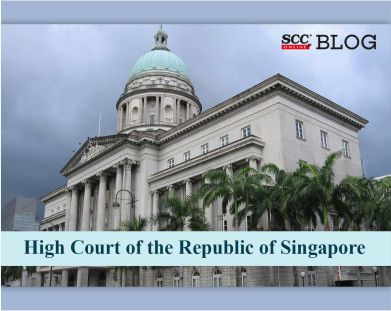High Court of the Republic of Singapore | Dismissing application for permission to seek a prohibiting order against the carrying out of their death sentences and court’s declaration that the two provisions violated Arts. 9 and 12 of the Constitution, Valerie Thean J., held that the presumption of innocence is not a mechanistic formula but a guiding principle that is expressed through technical rules.
“That the prosecution bears the burden of proving its case beyond reasonable doubt ‘provides concrete substance for the presumption of innocence’.”
The claimants in the case were convicted and sentenced to the death penalty by the High Court. An appeal against the conviction was also dismissed. The claimant in the case argued that Ss. 18(1) and 18(2) of the Misuse of Drugs Act 1973 (MDA) violate the constitutionally protected presumption of innocence and thus violate of Arts. 9 and 12 of the Constitution of the Republic of Singapore which protect the procedural rights aimed at securing a fair trial.
The claimants argued that the presumption of innocence is enshrined in Arts. 9 and 12 of the Constitution of the Republic of Singapore. The rights were described in Woolmington v. Director of Public Prosecutions, [1935] AC 462. But Ss. 18(1) and 18(2) of the MDA violate the constitutionally protected presumption of innocence as it shifts the burden of proof in respect of possession on the accused. This could lead to a situation where the accused is convicted even though a reasonable doubt exists as to his guilt. The claimant suggested that Ss. 18(1) and 18(2) should be interpreted in a way that they do not interfere with the constitutional rights of accused persons more than necessary. The claimant further stated that the provisions should be read such that the presumptions may be rebutted where the accused raises a reasonable doubt.
The defendant raised several procedural issues along with the limitation period. The defendant while rebutting the claimant’s argument stated that Ss. 18(1) and 18(2) of the MDA even though put burden of proof on accused but do not contravene Arts. 9(1) or 12 of the Constitution.
The defendant relied upon Ong Ah Chuan v. Public Prosecutor, [1979-1980] SLR(R) 710 and contended that while the presumption of innocence is a bedrock principle of the criminal justice system, it is settled law that Parliament may still legislate statutory provisions which shift the burden of proof to the accused in certain circumstances.
The Court relied upon Obeng Comfort v. Public Prosecutor, [2017] 1 SLR 633 in which it was explained that if the accused is proved to be in possession, control or custody of Controlled drugs, it gives rise to a presumption that he was in possession of a controlled drug. As per the judgment, the accused must prove on a balance of probabilities that he did not have knowledge of the nature of the controlled drug in order to rebut this presumption.
The Court stated that the claimants’ reliance on Art. 12(1) is misplaced, and the said provisions are not violative of fundamental rules of natural justice.
The Court relied on Ong Ah Chuan v. Public Prosecutor, [1979-1980] SLR(R) 710, where it was held that, “the equivalent of s 17 of the MDA, being a statutory presumption which, upon proof of certain facts, shifted the burden of proof to the accused and could be rebutted on a balance of probabilities, was not contrary to Art 9(1) of the Constitution.” and opined that Ss. 18(1) and 18(2) therefore comply with the rule stated in the above case.
The Court observed that despite the inmates’ assertion that they seek only to examine the Constitution, the true subject matter of their application was the propriety of their convictions. This amounted to an indirect attack on the earlier decisions in their criminal cases.
The Court opined that the presumption of innocence is not a mechanistic formula but a fundamental guiding principle that finds expression through technical rules. While dismissing the application for permission, the Court observed that there was no violation of Arts. 9(1) and 12(1) of the Constitution.
[Jumaat bin Mohamed Sayed v. Attorney-General, [2022] SGHC 291, decided on 25-11-2022]
Advocates who appeared in this case :
Hay Hung Chun, Claire Poh, Theong Li Han and Chong Ee Hsiun, Counsel for the Defendant.
*Ritu Singh, Editorial Assistant has put this report together.







